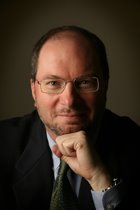Passings
Two magnificent singers have passed recently. Memories of their artistry will long be cherished by many.
Russian baritone Dmitry Hrvorostosky performed twice at Spivey Hall, first with the St. Petersburg Chamber Choir in November 1996. His October 4, 2000 solo recital launched the celebration of Spivey Hall's Tenth Anniversary Season. These concerts were both before my time at Spivey, but patrons fortunate enough to hear them remain passionate about them. My first-hand experiences with this artist include a remarkably beautiful portrayal of Tchaivkovsky's Eugene Onegin at Lyric Opera of Chicago, and as what I considered to be luxury casting when he sang the elder Germont (the tenor's father) in a Metropolitan Opera production of La traviata. In both instances he gave us gorgeous, richly expressive singing, with abundant and colorful sound, shapely and intelligent phrasing, nuance, and warmth. He is gone too soon and shall be greatly missed
Just this afternoon, I learned of American soprano Carol Neblett's passing. She has not been in the news of late as has Hvorostovsky, and unfortunately, I never heard her perform in concert, recital, or a staged opera production. However, her recording of Erich Korngold's opera Die tote Stadt with conductor Erich Leinsdorf and tenor Rene Kollo is one I return to time and again, “Glück, das mir verblieb” (also known as Marietta’s Lied) had me utterly transfixed for months once I discovered it the late 1980s. I had to listen again just now. Hear it on YouTube.
Such joy they bring to our lives, incredible artists such as these. For this we are grateful. May divine peace be theirs.
Russian baritone Dmitry Hrvorostosky performed twice at Spivey Hall, first with the St. Petersburg Chamber Choir in November 1996. His October 4, 2000 solo recital launched the celebration of Spivey Hall's Tenth Anniversary Season. These concerts were both before my time at Spivey, but patrons fortunate enough to hear them remain passionate about them. My first-hand experiences with this artist include a remarkably beautiful portrayal of Tchaivkovsky's Eugene Onegin at Lyric Opera of Chicago, and as what I considered to be luxury casting when he sang the elder Germont (the tenor's father) in a Metropolitan Opera production of La traviata. In both instances he gave us gorgeous, richly expressive singing, with abundant and colorful sound, shapely and intelligent phrasing, nuance, and warmth. He is gone too soon and shall be greatly missed
Just this afternoon, I learned of American soprano Carol Neblett's passing. She has not been in the news of late as has Hvorostovsky, and unfortunately, I never heard her perform in concert, recital, or a staged opera production. However, her recording of Erich Korngold's opera Die tote Stadt with conductor Erich Leinsdorf and tenor Rene Kollo is one I return to time and again, “Glück, das mir verblieb” (also known as Marietta’s Lied) had me utterly transfixed for months once I discovered it the late 1980s. I had to listen again just now. Hear it on YouTube.
Such joy they bring to our lives, incredible artists such as these. For this we are grateful. May divine peace be theirs.
